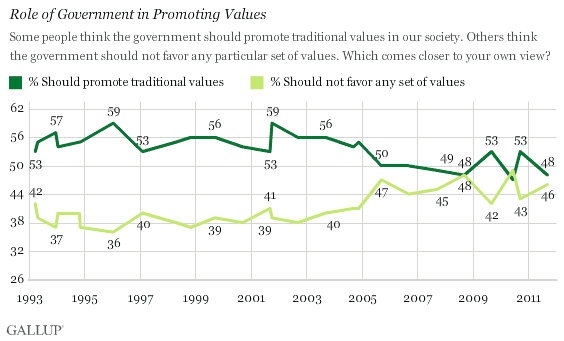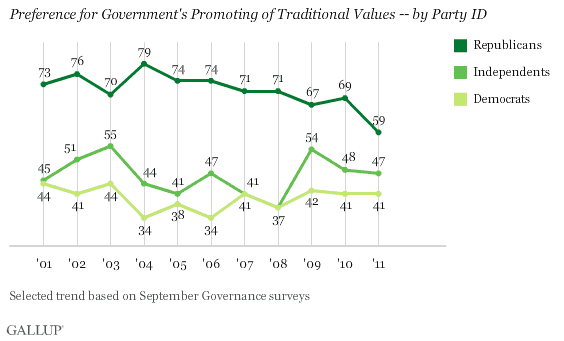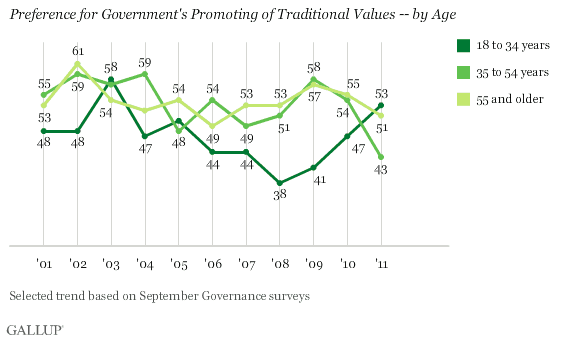PRINCETON, NJ -- Americans' once-prevailing view that government should do what it can to promote traditional values in society has weakened in the past decade. Today 48% hold that view, while nearly as many, 46%, say government should not favor any particular set of values.

The latest result is from Gallup's 2011 Governance survey, conducted Sept. 8-11. This is only the 4th time in 26 Gallup measurements of the question since 1993 that support for government's promoting of traditional values has fallen below 50%. All of these instances occurred in the past five years and came after a steady decline in public support since October 2001 for government's playing this role.
Republicans' Support for Government Promotion of Traditional Values Declines
The recent decline in support for government advancement of traditional values in society comes primarily from Republicans. While Republicans remain more supportive of this policy position than are independents and Democrats, their support has dropped by more than 10 percentage points since 2008, from 71% to 59%. By contrast, Democrats' support for it has held steady at about 40%, while independents' has been more variable.

Young Adults Now Most Likely to Favor Gov't Role in Promoting Values
In most of Gallup's Governance surveys from 2001 through 2010, older generations of Americans were more likely than those in Generations X or Y to say they want government to sanction and protect traditional values. However, the percentage of young adults -- aged 18 to 34 -- who want government to promote traditional values has been steadily increasing in recent years, rising from 38% in 2008 to 53% today.
As a result -- and owing to declines in older adults' support for government's promoting traditional values -- young adults are now the most likely to favor it.

The reason for these shifts in views by age is unclear. They neither track with changes in respondents' overall political ideology -- the percentages of each group labeling themselves "conservative" have held fairly steady over the same period -- nor do they parallel approval of the president. Presidential job approval rose sharply in 2009 among all groups when President Barack Obama replaced George W. Bush, and that might have been responsible for the increased support for government action with respect to traditional values the same year. However, approval of Obama has since declined among young adults as well as among older age groups, while young adults' support for government's promoting of traditional values has continued to rise.
Bottom Line
In contrast to a few years ago, when Americans firmly favored government's advancing of traditional values, Americans today are divided over whether government should actively promote traditional values or not favor any set of values. Recent support for the government's promoting traditional values has proved a bit volatile, twice spiking to 53%, but the broader trend clearly shows a change to a more even split in the public's views.
The trends by age raise questions about how permanent the shift in the overall trend is, with younger adults showing a recent surge in preference for advancing traditional values. Normally the views of young people are on the leading edge of social change. The finding that their views are now trending against the broader public shift toward the "government should stay neutral" position could make it harder for that position to further expand, or could eventually cause it to contract. Additionally, the recent decrease in Republicans' support for government's actively promoting traditional values could be tenuous and subject to reversal, depending on the issues debated in the upcoming presidential campaign.
Survey Methods
Results for this Gallup poll are based on telephone interviews conducted Sept. 8-11, 2011, with a random sample of 1,017 adults, aged 18 and older, living in all 50 U.S. states and the District of Columbia.
For results based on the total sample of national adults, one can say with 95% confidence that the maximum margin of sampling error is ±4 percentage points.
Interviews are conducted with respondents on landline telephones and cellular phones, with interviews conducted in Spanish for respondents who are primarily Spanish-speaking. Each sample includes a minimum quota of 400 cell phone respondents and 600 landline respondents per 1,000 national adults, with additional minimum quotas among landline respondents by region. Landline telephone numbers are chosen at random among listed telephone numbers. Cell phone numbers are selected using random-digit-dial methods. Landline respondents are chosen at random within each household on the basis of which member had the most recent birthday.
Samples are weighted by gender, age, race, Hispanic ethnicity, education, region, adults in the household, and phone status (cell phone only/landline only/both, cell phone mostly, and having an unlisted landline number). Demographic weighting targets are based on the March 2010 Current Population Survey figures for the aged 18 and older non-institutionalized population living in U.S. telephone households. All reported margins of sampling error include the computed design effects for weighting and sample design.
In addition to sampling error, question wording and practical difficulties in conducting surveys can introduce error or bias into the findings of public opinion polls.
View methodology, full question results, and trend data.
For more details on Gallup's polling methodology, visit www.gallup.com.
